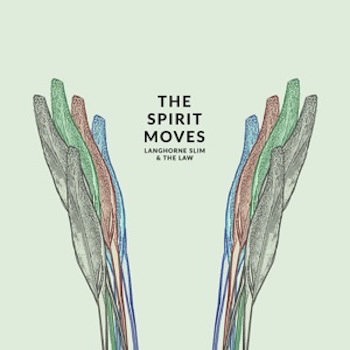Music Interview/CD Review: Langhorne Slim’s “Spirit” is Moving, Come Hell or High Water
The Spirit Moves is imbued with a sense of rebirth, emotional and creative, that pairs well with Langhorne Slim’s trademark barn-burning intensity.
By Matt Hanson

In the interest of full disclosure, I should say that I’ve been a fan of Langhorne Slim’s since the beginning of the century, back when we went to the same college. We never had more than a passing acquaintance, but I was hooked right away: every show of the many I attended was unique, galvanizing, and unpredictable. Not a bad way to start a career.
When I first started listening to him, Langhorne Slim’s style combined elements of dirty blues, poetic folk, insistent punk, and tongue-in-cheek performance art delivered with a preacher’s charisma, often with him standing on a chair and proclaiming stream-of-consciousness rants between one well-crafted, instantly memorable song after another. All I can say is, after watching Slim win over an entire room full of jaded, self-conscious film majors to sing along with Leadbelly’s “Gwine Dig A Hole To Put The Devil In,” it was obvious the guy was going places.
And gone places he has, I’m happy to say. Over the past few years, Slim’s mainstream exposure has increased to the point where his records have gotten high praise from fans and critics alike; he’s touring relentlessly and becoming a particular favorite of Conan O’Brien’s. As an ensemble, the live shows (previously with The War Eagles, and now with The Law) are less theatrical these days, but the intensity and the sincerity haven’t faded with time.
The Spirit Moves, his fifth record, marks a musical sea change. The production is cleaner, the songs more immediately accessible, and the record carries a reflective, introspective quality less emphasized in previous efforts. Apparently Slim has recently embraced sobriety (a trait rather lacking in his earlier shows, I must say) and the songs on The Spirit Moves form a loose narrative of the mourning process following the end of a relationship. When he ruefully sings “I’m rattling cages / I’m going through changes now” the conviction in his voice makes it easy to believe him.
Songs like the title track and the surging, Springsteen-esque “Southern Bells” continue in the old-time revivalist vein of his earlier work. The warmth of a live recording, each instrument brought to vivid life as a whole, is captured beautifully. “Strangers,” its first single, finds Slim bypassing the blues in favor of an upliftingly breezy pop sensibility. The apprehension of “Whisperin” eventually gives way to the embattled hope of ”Airplane.” culminating with a grand, bring-the-house-down, show-stopping summation on “Put It Together.”
The Spirit Moves is imbued with a sense of rebirth, emotional and creative, that pairs well with Slim’s trademark barn-burning intensity. The album’s real treat is seeing how he achieves the often tricky aesthetic feat of evolving as a person without losing the creative edge, keeping the spirit moving come hell or high water.
The Arts Fuse caught up with him during his recent tour over the phone on the way to a gig somewhere in Texas.
Arts Fuse: Where was the album recorded?
Langhorne Slim: The Spirit Moves was recorded in Nashville, near where I live now, in The Bomb Shelter studio in East Nashville.
AF: What influenced the record musically? What were you listening to while you wrote and recorded it?
Slim: Well, I was writing the record for two–three years, and I was listening to a lot of dead people (laughs). I couldn’t say if it came out in the music, but I was really obsessed with this Tropicalia compilation. Os Mutantes is a band I really admire, for being able to be really avant-garde and yet melodic and catchy at the same time. They wrote really amazing pop and folk songs while putting an interesting spin on the tradition.
I also listened to a lot of Olalbelle Reed. She’s this old-timey singer, who recorded these American standards over 50 years ago. “I’ve Endured” is one of her major songs. She just sings from some amazingly raw, honest, soulful place that I find incredibly moving. It seems simple at first, but of course it’s not simple at all but it still feels like it is. Her songs are full of ancient truths and she articulates something about the human condition that just goes right through you and hits you in your core. I tend to love the music that originates a whole new style, songs that became standards for years after they were released.
AF: Did you approach the recording process any differently than with previous records?
Slim: The biggest difference was that we recorded with Andrija Tokic who runs The Bomb Shelter in Nashville, he’s an incredible producer, and we just fell in love with him. Alabama Shakes recorded their new record at The Bomb Shelter. He’s worked with people I admire, people like Andrew Katz of Clear Plastic Masks, The Des Lounge from New Orleans, Hurray for the Riffraff. There was a sound in those records that was haunted and alive and wild and raw that I really connected to and wanted to see what would happen if I put the band through it. And the studio was down the street from where I lived, which helped as well.
Andrija put different guitars in my hand, different ways of recording the songs, made everything a little different technically. Andrija’s basic approach to recording was to record as much as we could live, as live as possible, guitars, drums, vocals, everything.
We’re really confident in our skills as a live band, and we’d definitely don’t want to lose any of that spontaneity on the record.

Langhorne Slim. Photo: Courtesy of the artist.
AF: A lot of the reviews I’ve read have talked about how your newfound sobriety went into the making of the record. Could you speak to that?
Slim: It just changes the filter through which you experience life. If you are a musician or an artist who’s been intoxicated for years, sobriety—I quit drinking on my birthday two years ago—it’s like stepping into a new existence, how it changes the music itself I don’t really know. It was important to see if I could do this without that—rattling, terrifying, and exciting. And it was a process of stepping into my truer self, which is a place I feel much more comfortable in now. I don’t know how that affects the music. I hope it does.
AF: Did you have a narrative in mind for the order of the songs on this record?
Slim: Not really. For the record we were going for just a cohesive musical experience, the narratives come out in the songs themselves. It’s more about letting the unconscious come out in the music, unearthing something that isn’t always at the surface, letting what’s in the songs come through in a soulful way.
AF: I heard Airplane took you a long time to come together, did most of the songs on this record take a long time to write or did they come together quickly?
Slim: I would say about 75–80% of my songs take a long time, a smaller number of the songs appear in a magical kind of way. I sometimes wonder if I’m singing songs I’ve heard before in some way. The others come out from elsewhere, just a piece that sticks in my head. Airplane took a long time to get it.
AF: “To Bring You My Love” has an interesting ambivalence—it starts off slow and seductive, but its climax is a kind of primal scream. Is there anything to that?
Slim: Isn’t it better for any song to start off slow and seductive to end in a primal scream? (Laughs) Yeah, there are a few places on the record where I’m definitely releasing some demons.
AF: What’s the feeling you want the listener to come away with when they hear this record? I get a very uplifting feeling from a lot of the songs, particularly “Southern Bells” and “Strangers.”
Slim: I think if people would connect with that, exactly that feeling, I would consider that a triumph. I just want to be as honest as I know how to be as a recording artist and be as true to myself as I can. Once the album is recorded and released, it’s really out of my hands.
In many ways, this record is about breaking out of one skin and into another one, staying in the moment, trying to keep a sense of wildness and remain there, not to tame any wildness in the music but to find a way to refine it and try to find a way to pursue feeling free.
Matt Hanson is a critic for The Arts Fuse living outside Boston. His writing has appeared in The Millions, 3QuarksDaily, and Flak Magazine (RIP), where he was a staff writer. He blogs about movies and culture for LoveMoneyClothes. His poetry chapbook was published by Rhinologic Press.
